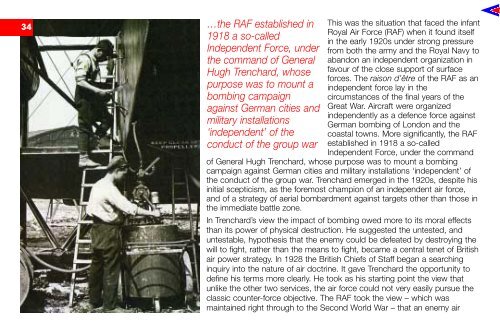THE RAF AIR POWER REVIEW - Royal Air Force Centre for Air ...
THE RAF AIR POWER REVIEW - Royal Air Force Centre for Air ...
THE RAF AIR POWER REVIEW - Royal Air Force Centre for Air ...
You also want an ePaper? Increase the reach of your titles
YUMPU automatically turns print PDFs into web optimized ePapers that Google loves.
34 …the <strong>RAF</strong> established in<br />
1918 a so-called<br />
Independent <strong>Force</strong>, under<br />
the command of General<br />
Hugh Trenchard, whose<br />
purpose was to mount a<br />
bombing campaign<br />
against German cities and<br />
military installations<br />
‘independent’ of the<br />
conduct of the group war<br />
This was the situation that faced the infant<br />
<strong>Royal</strong> <strong>Air</strong> <strong>Force</strong> (<strong>RAF</strong>) when it found itself<br />
in the early 1920s under strong pressure<br />
from both the army and the <strong>Royal</strong> Navy to<br />
abandon an independent organization in<br />
favour of the close support of surface<br />
<strong>for</strong>ces. The raison d’être of the <strong>RAF</strong> as an<br />
independent <strong>for</strong>ce lay in the<br />
circumstances of the final years of the<br />
Great War. <strong>Air</strong>craft were organized<br />
independently as a defence <strong>for</strong>ce against<br />
German bombing of London and the<br />
coastal towns. More significantly, the <strong>RAF</strong><br />
established in 1918 a so-called<br />
Independent <strong>Force</strong>, under the command<br />
of General Hugh Trenchard, whose purpose was to mount a bombing<br />
campaign against German cities and military installations ‘independent’ of<br />
the conduct of the group war. Trenchard emerged in the 1920s, despite his<br />
initial scepticism, as the <strong>for</strong>emost champion of an independent air <strong>for</strong>ce,<br />
and of a strategy of aerial bombardment against targets other than those in<br />
the immediate battle zone.<br />
In Trenchard’s view the impact of bombing owed more to its moral effects<br />
than its power of physical destruction. He suggested the untested, and<br />
untestable, hypothesis that the enemy could be defeated by destroying the<br />
will to fight, rather than the means to fight, became a central tenet of British<br />
air power strategy. In 1928 the British Chiefs of Staff began a searching<br />
inquiry into the nature of air doctrine. It gave Trenchard the opportunity to<br />
define his terms more clearly. He took as his starting point the view that<br />
unlike the other two services, the air <strong>for</strong>ce could not very easily pursue the<br />
classic counter-<strong>for</strong>ce objective. The <strong>RAF</strong> took the view – which was<br />
maintained right through to the Second World War – that an enemy air

















